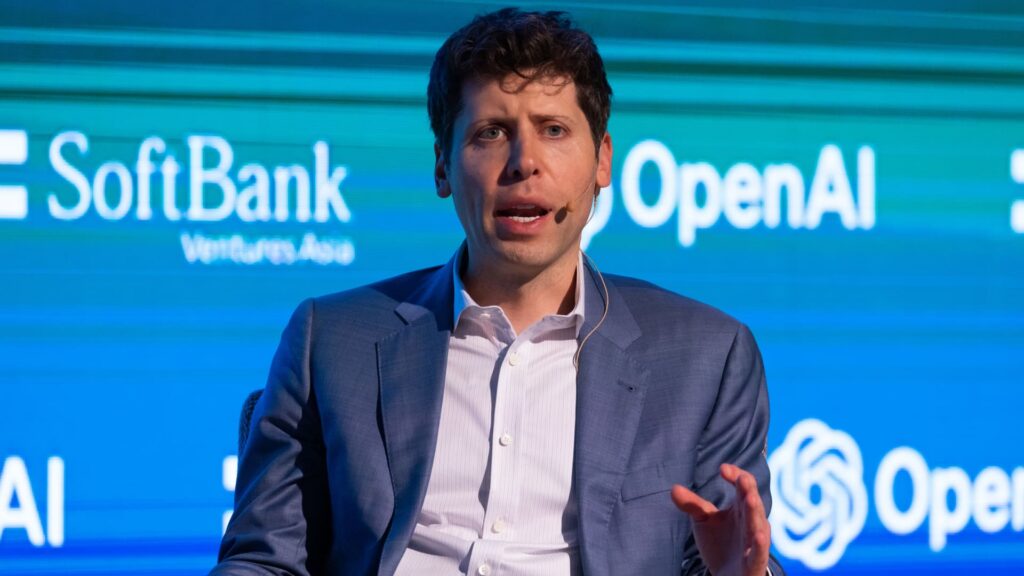Sam Altman, chief executive officer of OpenAI, during a fireside chat organized by Softbank Ventures Asia in Seoul, South Korea, on Friday, June 9, 2023.
SeongJoon Cho | Bloomberg | Getty Images
Sam Altman’s $6.4 billion bet on Jony Ive is a callback to strategy employed by another Silicon Valley tech billionaire: Meta CEO Mark Zuckerberg.
OpenAI on Wednesday said it’s buying Ive’s nascent devices startup io in what is by far the largest acquisition in the artificial intelligence company’s 10-year history. It’s a decidedly big bet on a secretive hardware company co-founded by Ive, who famously designed Apple’s iconic iPhone, iPod and iPad.
In a post on X alongside a nine-minute video with Ive, Altman called his new colleague “the greatest designer in the world.”
The all-stock deal represents a staggering sum, particularly at a time when venture firms have been thirsty for exits due to a yearslong dearth of IPOs and big acquisitions. For OpenAI, the purchase represents just over 2% of its paper worth after the company was valued at $300 billion in a SoftBank-led round in March.
As CEO of the most high-valued tech startup in the U.S. and perhaps the most high-profile private company on the planet, Altman’s position in the industry is reminiscent of where Zuckerberg sat 13 years ago, as he was preparing to guide Facebook through what at the time was the largest tech initial public offering ever.
A month before its debut, Facebook announced the acquisition of a 13-person photo-sharing startup with no revenue called Instagram in an effort to gain traction in the fast-growing mobile apps market. The biggest concern investors had about Facebook was its reliance on the web and that wasn’t generating “any meaningful revenue from the use of Facebook mobile products,” according to its IPO prospectus.
With the Instagram purchase, Zuckerberg said that Facebook wanted to “learn from Instagram’s experience to build similar features into our other products.”
“This is an important milestone for Facebook because it’s the first time we’ve ever acquired a product and company with so many users,” Zuckerberg wrote. “We don’t plan on doing many more of these, if any at all.”

Less than two years later and with a public stock ticker to his company’s name, Zuckerberg went even bigger, spending $19 billion on messaging app WhatsApp, which recorded about $15 million in revenue for the first half of 2014, while losing more than $200 million during that period. But WhatsApp had over 450 million monthly users and was growing at a rate that potentially threatened Facebook.
“If I’m talking a year from now and they have a billion users, I think this is going to be a home run deal,” equity analyst Youssef Squali told CNBC’s “Squawk on the Street” after the purchase was announced. “That to me is the clear part about this.”
WhatsApp reached 2 billion monthly active users in 2020, and that number has since reached 3 billion, Zuckerberg said on the company’s first-quarter earnings call in April. In the quarter, Meta’s Family of Apps segment, which includes Facebook, Instagram, Messenger, WhatsApp and other services, generated $41.9 billion in revenue, the vast majority of total company sales.
Instagram and WhatsApp have become so integral to the overall business that the Federal Trade Commission claimed in its antitrust suit against Meta that the acquisitions should never have been allowed and have helped the company keep its dominance “to the detriment of competition and users.” Meta disputed the FTC’s argument and said the market remains competitive. The trial kicked off in April.
A much smaller piece of Meta’s business comes from another big wager Zuckerberg made in acquiring Oculus VR for $2 billion in 2014, before the virtual reality headset maker had launched a consumer product. Oculus is now Meta Quest, the hardware centerpiece of the company’s Reality Labs unit and its pivot to the metaverse.
A visitor wears a virtual reality headset Meta Quest as he takes part in an immersive experience stand during the Viva Technology show at Parc des Expositions Porte de Versailles on May 24, 2024 in Paris, France.
Chesnot | Getty Images
While Instagram and WhatsApp are generally lauded as big wins for Zuckerberg, Oculus remains a question mark. Reality Labs is losing billions of dollars a quarter on minimal revenue.
Zuckerberg said on the latest earnings call that “AI glasses have really taken off” and the company sees opportunities to invest in ramping up distribution, indicating that it’s still a bet on the future.
Similarly, investors will likely have to wait years before evaluating OpenAI’s acquisition of io.
Other than bringing in Ive, it’s not exactly clear what Altman is getting. That’s because Ive’s so-called creative collective called LoveFrom, which generates revenue from its design work for clients like Airbnb and Ferrari, will stay independent, working on projects with OpenAI and other companies.
Altman and Ive wrote in a blog post on Wednesday that io was started a year ago and has “focused on developing products that inspire, power and enable.” In joining OpenAI, io will “work more intimately with the research, engineering and product teams in San Francisco,” the post said.
Zuckerberg has defied financial logic and skeptics in riding acquisitions to a $1.6 trillion market cap for Meta, a fifteen-fold increase over Facebook’s IPO price.
Altman has already defied tradition, taking what was a nonprofit AI lab a decade ago and turning it into a $300 billion private market behemoth. He now has the iPhone designer on his side to try and figure out what comes next.
“Excited to try to create a new generation of AI-powered computers,” Altman wrote on X.



